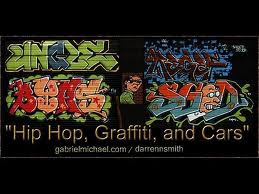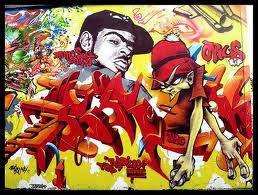Introduction
The two songs that I have selected are classified under the hip-hop genre of music. This is a genre that came about as a result of the hip-hop culture. It can be described by four major stylistic elements that define it, and those are rapping, deejaying or scratching, sampling and beatboxing. Looking at the history of hip hop, it started in the 1970s in New York at a place known as South Bronx. Hip hop can be traced from African-American music as well as African music. A community was originally known as the griots from West Africa, hundreds of years back were known to have a culture of singing and reciting poems when traveling with a vocal style that does not differ much from rapping. As earlier mentioned, hip hop started in the 1970s when African-American and Puerto Rican cultures were fused (Crossley 2005).
Another major aspect of the hip hop culture was the turntabling techniques e.g. the scratching technique which is believed to be an invention of Grand wizard Theodore, beat mixing, and juggling that created a base essential for rapping.
Hip-hop dancing styles were influenced by the Latino culture that was seen practiced by the Puerto Ricans that were living in Bronx New York. The Jamaican community also played a role in the development of the hip-hop culture. They influenced the vocal style that was associated with the rapping technique by doing simple rap songs at their public functions that were inspired by their toasting tradition (Crossley 2005).
As hip hop grew, the rappers started incorporating new creative styles on their vocal and systematic delivery by the inclusion of brief rhymes to entertain even better. In the earlier days, hip hop production was done by groups since groups had the stage presence and drama necessary to entertain audiences. With time solo artists that could individually deliver as well as entertain emerged and people started doing solo projects.
Looking at the lyrics of both the songs I have chosen, it is quite obvious that disco has a major influence on this style of music. The lyrics of the song talk about the high and luxurious life the hip hop artists are living, spending lot of money partying and in discos. Listening to the song you also realize the influence of the early European disco beats that is quite funky as the Europeans describe it.
When you take a study of the lyrics you also realize that it offers a platform for lyricists or poets to testify about their life experiences. This can be used positively to encourage hip hop lovers and to advice those listeners on how to handle the highs and lows that are characterized with this world, just as Kid Cudi in his song advices those who grew up with single parents to take heart and define their individual destinies. Another feature that would not go unnoticed is the bragging that largely characterize hip hop songs. In both songs you realize of how much all the artist tend to speak about their incomparable musical abilities as well as their large financial abilities that enable them to live luxurious lives.
The lyrics of the songs also show how much hip hop has embraced vulgar language to an extent that a hip hop song would seem incomplete without incorporating vulgar words and the street language best known as the slang. Hip hop has embraced a culture of disrespecting women, calling them names that portray them as sex tools that are valuable in satisfying men’s daily sexual desires and pleasure.
In marketing hip hop different artists, music labels, music distributors and all the other stakeholders have implemented different strategies. It has come to the notice of many people that most of the hottest and coolest teenage musical, language and fashion trends just as they are fondly described by them; originate in the inner cities of America before fast spreading to the suburbs (Settersten 2005). One of the strategies that the hip hop stakeholders have used to market their music is targeting the teens who are settled in the urban setups. This way information is able to trickle down to the suburbs hence widening their market structures.
In the early days, music and entertainment television stations that were available declined playing hip hop music. Even worse they refused to play anything by black artists. This was until when new television broadcast channels were launched that were courageous enough to change this trend. These broadcast channels have provided a mechanism that recently has been the most popular in marketing hip hop music. Most artists nowadays produce video versions of their hit singles that are entered for chat competitions weekly. Votes are normally gathered from viewers and listeners. This has provided a mechanism for determining popular artistic works as well as the most popular and idolized artists and entertainment individuals.
Teens in America have always shown a tendency of being fascinated by high money and fame scorers, hardcore personalities who are never cowed by social and political strictures such as Tupac Shakur and DMX. As a result of this, many hip hop artists and recording labels have concentrated their energy towards making music that is rebellious and violent to be able to tap this market.
On the cover of the CDs of the music albums I chose together with many other albums, the difference is quite slim. I discovered that it entails a harmonious graphic with high standards of creativity. It is quite obvious that it is influenced by the hip hop culture and specifically the graffiti technique. The graffiti, just as earlier mentioned is one of the major elements that define hip hop. It represented the visual creative art just like the b-boy stance represented the dance as a creative art.


One of the most discouraging and discrediting element of these songs when you listen to them or maybe have a look at the lyrics is the negative message it conveys about the ladies or rather the women in our society. The artists have used names that merely describe the women as sex equipments that they use to quench their sexual desires. This is a very dangerous trend that is having negative effects on the lives of the teenagers all around America.
A lot of study research on the sexual and moral effects especially on the black community has shown that hip hop is having a very negative effect on the sexual lives of the black teenage community. The two hip hop songs that I chose as well as several others have greatly influenced teenagers to become sexually active at very tender ages. The studies also show that they are being infected by HIV/AIDS and other sexually transmitted diseases at a much higher rate than the other ethnic groups. Kid cudi in his song talks about having 99 problems and they are all “bitches”, this show you how many women Kid Cudi would comfortable engage with sexually and still find it normal. Many teens who idolize this artist and the hip hop culture would therefore do the same without seeing the challenge this actions come with. Studies have shown that the more the partners you engage with sexually, the more your chances of infection increases.
I would be dishonest not to say that this music has a negative effect on the youth community of the current society. According to research carried out by Dr. Cynthia Winston, an assistant professor of psychology at Howard University, this music promotes drug use which at the same time is a major cause of youths engaging in violent activities and behavior. The lyrics and the personality of the artist as portrayed by the pieces of music influences or rather subject the teens to the negative views of the society (Winston 2005).
The lyrics that accompany these songs are very dissolute and misleading. For a long time now, music has acted as a means of expressing ones emotions in different ways and perspectives. On top of that is also been used to influence, to pass information and to teach. Hip hop for a long time on its side has been associated with lyrics that convey negative messages, promote and advocate for the abuse of illegal drugs and substances. These songs just like their genre describes them are not an exception to this trend. As these songs talk about substance use, “I’m this close to going and trying some coke”, it does not subsequently inform its listeners of the negative effects of substance abuse. This trend is therefore a dangerous one considering that studies show that most young people are idolizing these artists and are easily being influenced by them.
Conclusion
Hip hop has contributed largely to the decline of the moral standards practiced in our modern society today. It has set a bad trend to the young people of its generation, promoting violence, drug abuse, and sexual immorality.
Young black members of the American society are already feeling the negative effects of this influence. HIV/AIDS and many other sexually transmitted diseases have become rampant among the black population. Something has to be done and done quickly to salvage the situation.
Reference list
Crossley, S. (2005). Metaphorical Conceptions in Hip-Hop Music: African American Review. Louisiana: St. Louis University Press, pp.501-502.
Settersten, R. (2005). On the frontier of adulthood: theory, research, and public policy. Chicago: University of Chicago Press.
Winston, C. (2005). Biological anthropology and ethics. Arizona: Sunny press.